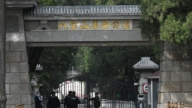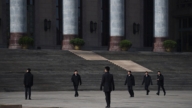【新唐人2013年03月26日讯】在3月24号的“中国发展高层论坛2013”年会上,“北京大学”经济系教授张维迎,向发改委副主任朱之鑫连番“开炮”,质疑目前中共政权实施的产业政策,并没有使相关企业良性发展,还导致产能过剩等一系列问题。张维迎轰发改委:“过去十年只关注发展,不太关注改革”。
张维迎的提问赢得现场两次热烈掌声。他说,最近中国的“光伏产业”处于严重危机当中,领头企业“无锡尚德”已经处于破产程序。而在过去十多年,从中央政府到地方政府,以产业政策的名义,给这个行业和这些企业大量的资金和其他方面的支持。
张维迎认为,产业政策已经成为“腐败和寻租”的重要根源。
“北京天则经济研究所”副所长冯兴元表示,当局的产业政策,就是先选定一些产业优先发展,然后提供补贴项目。
北京天则经济研究所副所长冯兴元:“产业政策因为是政府控制资源,控制投资方向,有时候政府自己投资,或者扶植其他企业去投资,包括政府控制很多基金,我们把它叫做‘设租’,其他人就可以为了要项目,就可以寻租。企业也好,地方政府也好,肯定是腐败滋生的一个很大的来源。”
冯兴元认为,这种所谓“产业倾斜政策”却是反竞争的行为,对市场常常造成负面效果。
冯兴元:“产业政策对于获得补贴者,它可能是一种特权。对于没有获得补贴者,都是没有享受到特权,实际上竞争不平等。尤其是中国倾向于促进龙头企业发展,等于是产业里边带头的企业,拿到的国家项目补贴多,或者享受税收优惠,那是反竞争的行为。”
冯兴元还表示,最近中共调整煤矿产业,让温州的煤矿矿主退出江西的煤矿业,等于国营的煤矿业把温州的煤炭业地盘据为己有。冯兴元说,这里面肯定会出现很大的腐败。
冯兴元还指出,经济学家尼斯坎南有一个模型叫“预算最大化官僚”,就是﹕官僚都喜欢预算大,自己控制着钱,然后全部花掉。
冯兴元说,中共老想控制资源,搞国有企业投资,或自己控制资源来花费。尤其是发改委控制了很多产业基金,他认为,这是个人的私心在作怪。
冯兴元:“如果是高新技术产业促进,用私人资本的引入,要远远好于财政投入。像私募基金,他们是专业团队,他们识别投资项目,识别技术,他们的能力非常强,远远高于政府。”
冯兴元表示,无论是维护旧有的经济结构,还是扶植创新的产业,中共当前的产业政策都是弊病多多,失败多于成功。
如:当局对那些可能要被淘汰的夕阳产业提供补贴,原本那些亏损的行业,由于政府的补贴却维护了下来。冯兴元说,维护旧有结构的产业政策,实际上是维护了旧有低的生产率。
而在扶植创新行业这方面,冯兴元认为:中共往往盲目的提供补贴。
张维迎在提问当中说,发改委全名叫“发展与改革委员会”,但是发改委过去十年,其实只关注发展,不太关注改革。但大部分权力都在发改委手里。他诘问发改委决定怎么放权?发改委自身怎么去改革?
张维迎还指出,目前中国有很多产业出现产能过剩问题。他质问朱之鑫﹕会不会重新反思产业政策﹖把重点放在怎么创造更好的公平环境,而不是让某些产业和某些企业,利用财政的钱对他们进行补贴。
朱之鑫在回答提问时,婉转否认发改委造成产能过剩、滋生腐败以及改革停滞,他宣称中国有中国的特色和道路。但他又表示,“要有更大的政治勇气和智慧”来面对这些问题。
采访编辑/秦雪 后制/钟元
Chinese Economist Criticized National Development and Reform Commission
On March 24th the annual meeting of
“China Development Forum 2013” was held in Beijing.
Zhang Weiying, Professor of Economics Department of Peking
University, continuously raised questions at the meeting.
Zhang questioned Zhu Zhixi, vice director,
National Development and Reform Commission (NDRC),
on why the current industrial policy didn’t make
enterprises run better. On the contrary,
it resulted in a series of problems, such as over capacity.
Zhang said: “in the last decade, NDRC only concentrated on
the development, but not the reform.”
Zhang said that recently the photovoltaic industry in China
was facing serious crisis.
The leading company “Suntech Power Holdings” started
bankruptcy proceedings.
In the last decade, the central and local governments provided
a large amount of money to this industry and related companies.
They also gave other support, under the name “industrial policy”.
Zhang believes that “industrial policy” became the leading
cause of corruption.
Feng Xingyuan, deputy director of Bejing Uni-rule Institute
of Economics made comments.
Feng said the current industrial policy strategy is to launch
selective projects, develop them first, later create subsidy projects.
Feng Xingyuan: “For industrial policy, the government
controls resources and gives investment guidelines.
Sometime the government makes investment,
sometimes supports other firms to invest.
The government controls many funds; we call it “rent-setting”.
In order to get the project, people will take rent-setting.
No matter it is an enterprise or a local government,
they are certainly creating a great source of corruption.”
Feng believes that the so-called “industry preferential
policies” are actually anti-competitive.
They resulted in negative impact on the market.
Feng Xingyuan: “Industrial policy” could become
a privilege for subsidy winners.
However, those who don’t win subsidies also won’t have
Privileges. Actually, it’s inequality of competition.
Also promoting the leading firms is in the government’s
favor, so leading companies will receive the most subsidies.
The leading enterprises enjoy the Tax Preference,
which is an anti-competitive behavior.”
Feng also said that the Chinese Communist Party (CCP)
recently reorganized the coal mining industry.
They forced coal mine bosses in Wenzhou to leave the coal
mine business from the coal industry in Jiangxi Province.
It means the state-owned coal business took Wenzhou’s
company over for itself.
Feng said that there is bound to be a lot of corruption.
Feng pointed out that economist Niskanen created the
“budget-maximizing model”.
It means bureaucrats like to have a large budget,
then control the money and spend it all.
Feng said the CCP always wants to control the resources,
invest in state-owned business, or control resources and spend it.
Especially NDRC controls many funds, this is selfish behavior.
Feng Xingyuan: “Promoting high-tec industries and
introducing private capital will be far better than CCP investment.
For example, for private equity funds, they are an expert team,
they can sense the right project and skills.
They are very capable, and are
far better than the government.”
Feng said that whether maintaining the existing economic
structure or promoting innovative industry,
the CCP’s industrial policies have many disadvantages,
with more failure than success.
E.g. the CCP provided compensation to those declining
industries which were underperforming.
However, due to the compensation, they survived.
Feng said that maintaining existing industrial policy,
is actually maintaining the existence of low productivity.
Feng believes that in the area of promoting innovative
industry, the CCP often blindly provides compensation.
Zhang Weiying said in his question that NDRC’s full name
is “Development and Reform Commission”.
However, over the past decade, NDRC only focused on
development, not concerned with the reform part.
In addition, NDRC has the most power.
Zhang asked NDRC how they plan to release the power.
How does NDRC itself reform?
Zhang also pointed out that in China,
Excess Capacity exist in many industries.
Zhang asked Zhu Zhixi: “Will you re-think industrial policy
to focus on how to create a fair better environment?
Rather than using fiscal money to subsidize some
declining industries and businesses?”
In response to the questions, Zhu tactfully denied saying NDRC
has made Excess Capacity, corruption and reform stagnation.
Zhu claimed that China has its own character and path.
Yet he also said they “need even more political courage
and wisdom” to face these problems.

























